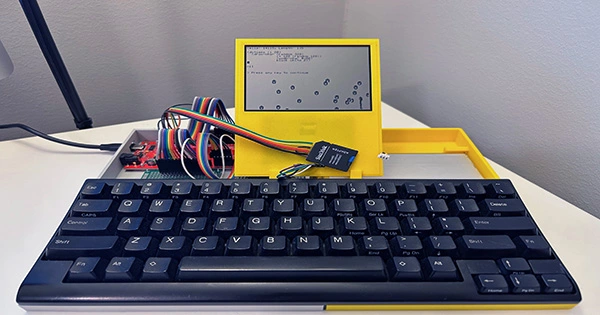The PotatoP is a type of laptop created by Norwegian software developer Andreas Eriksen that has “a battery life measured in years” and is also Lisp-programmed.
“”This movie must have been filmed with a potato!” is a common expression used to characterize a weak or poorly functioning device. In order to guarantee a long battery life, this device has been purposefully under specced “Eriksen gives an explanation of the project’s odd name. “The ‘toP’ suffix indicates the planned ultimate laptop form factor. For LISP predicates—functions that yield true or false, such as “evenp” or “primep” for numbers—the suffix “p” is used. Is it or isn’t it a potato? Depending on your viewpoint, yes or no!”
The PotatoP prototype, which resembles a luggable more than a conventional laptop, is made entirely of low-power components. Its brain is a SparkFun Artemis module with Bluetooth 5.0 Low Energy (BLE) connectivity and a single low-power Arm Cortex-M4F processor operating at up to 96MHz. Eriksen runs PotatOS, a modified version of uLisp, a Lisp created especially with microcontrollers in mind.
The display is frequently the most power-hungry component in portable laptops. Eriksen chose a 4.4″ SHARP Memory Display, a technology that falls somewhere between ePaper and conventional liquid crystal displays (LCDs) and uses the least power to prevent using too much power there.
The final prototype has a microcontroller at its core and a low-power display, which makes it remarkably energy-efficient. Eriksen says the prototype can run for “up to two years, depending on ambient light” with a 12Ah lithium-polymer battery installed and a small solar cell mounted to the right of the screen to recharge it. The goal is to make the final product run endlessly on ambient light harvesting.
The PotatOS source code has been made available on GitHub under the permissive MIT license, and more details about the project are available on Eriksen’s Hackaday.io website.















